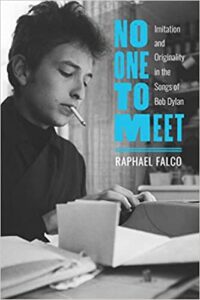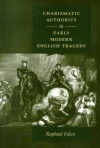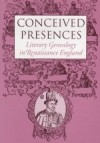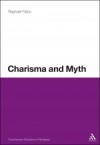
Areas of Interest: English Renaissance Literature, Myth, Colonial and Postcolonial Literature, and 20th-Century American Poetry
Contact Information
Email: falco@umbc.edu
Office: PAHB 415
Office Number: 410-455-2384
Education
Ph.D., New York University
M.A., Columbia University
B.A., Columbia University
Biography
Raphael Falco, Professor of English, was the 2012-2013 Lipitz Professor of Arts, Humanities, and Social Sciences at UMBC. In 2016, he was accepted into the Fulbright Scholars Program, a five-year commitment, and in 2017 he traveled to Russia as a Fulbright Scholar to lecture at Astrakhan State University. He has received, among other awards, a 2005 Folger Institute Fellowship, a Dresher Summer Faculty Fellowship (2018), and a CAHSS Dean’s Research Fund Fellowship (2015). He is Founding Editor of the Dylan Review and the book review editor of Soundings: An Interdisciplinary Journal.
Professor Falco teaches courses in Renaissance humanism, sixteenth-century courtliness, colonialism and literature, myth and literature, John Milton, modern poetry, and Bob Dylan. A member of the Authors Guild, he publishes plays, short stories, and poetry in addition to academic research.
For more information about Professor Falco, please visit his website at
www.RaphaelFalco.com.
Representative Publications
- “Goya’s Kiss: Dylan and the Arts.” In Brian Hosmer and Sean Latham, eds., The World of Bob
Dylan. Cambridge, UK: Cambridge University Press, 2021. - “Suspense Revisited: Complicity, Coercion, and the Shared Experience of Time.” Forms of Time: Temporality, Language, and Genre in the Age of Shakespeare, edited by William C. Carroll and Lauren Shohet, Bloomsbury/Arden, 2018.
- “Tudor Transformations.” Shakespeare and the Soliloquy in Early Modern English Drama, edited by Anthony Cousins and Daniel Derrin, Cambridge UP, 2018.
- “Othello, the Turks, and Cyprus.” Othello, edited by Robert C. Evans, Bloomsbury, 2015.
- “Charisma and Myth.” The Ashgate Research Companion to Anthropology, edited by Andrew Strathern and Pamela J. Stewart, Ashgate, 2015, pp. 99-123.
- “Women, Genealogy, and Composite Monarchy in Michael Drayton’s Poly-Olbion.” ELR, 2010.
- “Arbitrary Cause.” Diacritics, vol. 35, 2005, pp. 1-13. [Issued 2007]
- “Marsilio Ficino and Vatic Myth.” MLN, vol. 122, 2007, pp. 101-122.
- “Tragedy in Retrospect: Hamlet’s Narrative Infrastructure.” The Shakespearean International Yearbook, vol. 7, 2007, pp. 123-139.
- “The Erotic Sacrament: Max Weber and Georges Bataille.” Max Weber Studies, vol. 7, 2007, pp. 13-36.
Books
No One to Meet: Imitation and Originality in the Songs of Bob Dylan 
University of Alabama Press, 2022
No One to Meet: Imitation and Originality in the Songs of Bob Dylan places Dylan the artist within a long tradition of literary production and offers an innovative way of understanding his unique, and often controversial, methods of composition. Raphael Falco demonstrates the similarity between what Renaissance writers called imitatio and the way Dylan borrows, digests, and transforms traditional songs. Although Dylan’s lyrical postures might suggest a post-Romantic, “avant-garde” consciousness, No One to Meet shows that Dylan’s creative process borrows from and creatively expands the methods used by classical and Renaissance authors. By placing Dylan firmly in the context of an age-old poetic practice, No One to Meet deepens our appreciation of Dylan’s songs and allows us to celebrate him as what he truly is: a great writer.
 Cultural Genealogy: An Essay on Early Modern Myth
Cultural Genealogy: An Essay on Early Modern Myth
Routledge, 2017
Cultural Genealogy explores the popularization in the Renaissance of the still pervasive myth that later cultures are the hereditary descendants of ancient or older cultures. The core of this myth is the widespread belief that a numinous charismatic power can be passed down unchanged, and in concrete forms, from earlier eras. Raphael Falco shows that such a process of descent is an impossible illusion in a knowledge-based culture. Anachronistic adoption of past values can only occur when these values are adapted and assimilated to the target culture.
Continuum, 2010
Charisma and Myth is a fascinating study that introduces a new approach to myth. By applying charisma theory, Raphael Falco challenges myth theorists from the nineteenth through to the twenty-first century and adds a missing component to our understanding of how and why myths continue to grip our imaginations. Through scores of examples ranging from Inuit myth to Christian theology, from Malinowski to martyrology, Charisma and Myth argues definitively that the survival of myth systems mirrors the survival of such charismatic groups as modern street gangs, the Anglo-Saxon comitatus, or Satan’s fallen angels in Paradise Lost.
 Charismatic Authority in Early Modern English Tragedy
Charismatic Authority in Early Modern English Tragedy
Johns Hopkins University Press, 2000
Charismatic groups form around a leader who displays extraordinary abilities in times of social distress and who is often thought to have supernatural or magical powers. Raphael Falco demonstrates that English tragedies are full of such figures, including Marlowe’s Tamburlaine; Shakespeare’s Richard II, Hamlet, and Othello; Milton’s Samson; and the various dramatic representations of Cleopatra. Tragedies often focus on this difficult process of charismatic transformation–a process that is best understood not in terms of a single tragic figure but as a group experience.
 Conceived Presences: Literary Genealogy in Renaissance England
Conceived Presences: Literary Genealogy in Renaissance England
University of Massachusetts Press, 1994
This study explores the manner in which English Renaissance poets invented a poetic genealogy. The title comes from Franciscus Junius, who in 1638 used the term “conceived presence” to describe the ancient masters whose paintings had been lost but who nonetheless remained important forebears of the tradition of visual art. Raphael Falco applies the notion of “conceived presences” to late sixteenth-century poets intent on establishing a national literature. They too conceived the presence of their forebears, both ancient and modern.
